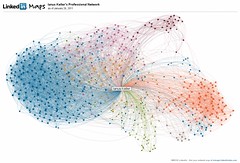 |
| Zen (Photo credit: Josefe aka Hipnosapo) |
- Assess your current environment. There are a number of ways to do this, so figure out what works for you and do it. You may ask a set of questions like, "What ideas speak to me?", What music lifts me?", and "what dreams inspire me?". If you are not getting what you need in your current environment then make some changes - this is not easy.
- Change yourself and your environment. Change both for maximum growth and more successful growth. Define your growth environment. List the key points of your environment, and mark each one with true or false for your current environment. If you answer false to more than five of these statements, your current environment may be hampering your growth. My key environment points list is a variation of the authors:
- Others are ahead of me.
- I am challenged at the right times.
- My focus if forward.
- The atmosphere is affirming.
- I am often out of my comfort zone.
- I wake up excited.
- Failure is not my enemy.
- Others are growing.
- Growth is modeled and expected.
- Change who you spend time with. The most signficant factor in a person's environment is the people. If you change nothing else in your life for the better, change that and you have increased your chances of success. This is not an easy thing to do, but face the facts and clean house if needed, and things will change.
- Challenge yourself in your new environment. Make your goals public, pick a growth opportunity each week, etc. A post by Bruce Kasanoff about how to help structure your week is a great start at this, and I have added to his one page, weekly activity list by putting my quarterly goals in the same document. This enables me to review my quarterly goals each week and then plan my week with my goals in mind, knowing what I have achieved previously. By the way, I have posted my quarterly goals up on bathroom mirror as well so I see them every day. This is a huge step - much bigger than you realize until you do it.
- Focus on the moment. The only moment we have control over is the "now". "Today is when everything that is going to happen from now on begins". Do what you can do in each "now".
- Move forward despite criticism. "Growth always comes from taking action, and taking action almost always brings criticism." Reach for what you want, make your own decisions, and then stick with them no matter what people say.
Thoughts? Comments?
Please repost this if you think it is worth it!
..Brian..




































